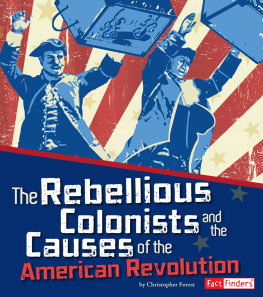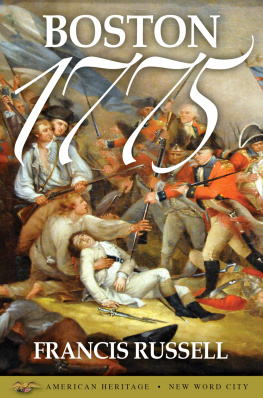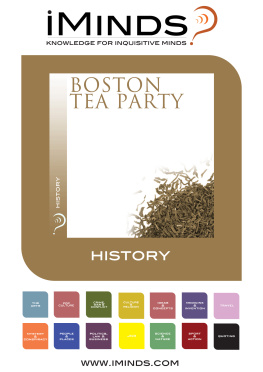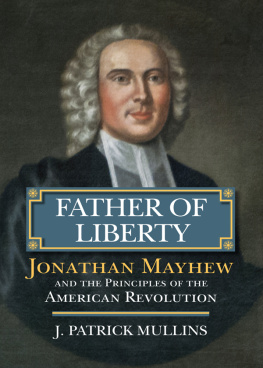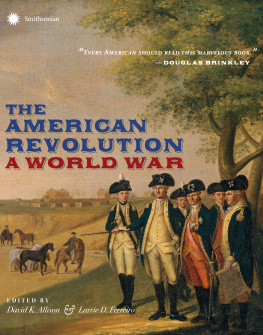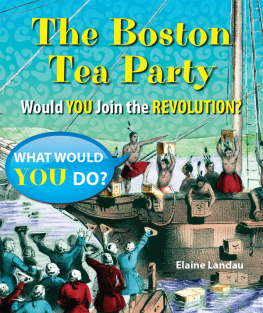Library of Congress
Cataloging in Publication Data
Reid, John Phillip.
In a rebellious spirit.
Includes bibliographical references and index.
1. LawMassachusettsHistory and criticism.
2. MassachusettsHistoryPrerevolutionary period, ca. 17661775.
3. LawUnited StatesHistory and criticism.
I. Title. KFM2478.R43
340.09744 78-50065
ISBN 0-271-00202-6
Copyright 1979
The Pennsylvania State University
All rights reserved
For
Macdonald and Agnes Smith Budd
of Monroe Place
That in general, our opposition to the Stamp-Act has been highly approved of in England,except the acts of violence,the destruction and plunder of private property; which tho generally disapproved among us, and executed by Men not all concerned in our cause, who, taking occasion from the tumults which oppression naturally produces, to perpetuate their evil designs without discovery, furnish the enemies of the colonies, (authors of their oppression, and consequently of all the tumults and disorders arising therefrom) with arguments which they are glad to improve against them, and endeavour to impute to the general body of the inhabitants, whom they would represent as actuated by a rebellious spirit, disaffected to the legal government of their country.
A private letter quoted in the Boston Evening Post, 3 March 1766.
Law and history must be approached with caution. Although often mixed, they do not mix well. To employ history as legal precedent is to tempt the anger of Clio. To use legal briefs, litigation, or forensic confrontation as historical evidence of motivations is to run the risk of distortion and misinterpretation. The historian cannot treat the words of a lawyer speaking professionally as the words of a nonlawyer might be treated. All too often what an individual says while engaged in a forensic argument tells us not what that person thought, but what he wanted someone else to think. Historians cannot rely on an argument of facts as evidence of events that have occurred or explanations of why those events occurred. It may bein truth it is most likelythat a forensic argument of facts is evidence only of what the arguer wanted someone to believe had occurred or why it had occurred.
During the stamp-act crisis of 1765, when mobs moved freely on the streets of Boston, Governor Francis Bernard of Massachusetts Bay was a man besieged. Then, as whigs anticipated repeal of the act, a period of good feelings and political calm reigned in the colony. There is such an appearance of tranquility that I may remain here a cypher some time longer, the governor then wrote London. When we read this statement our first reaction is to think that Bernard was fearful of events or had been fearful at the time of the stamp-act riots. Far more likely, the words do not reveal that the governor, in fact, was afraid of Bostons mob. He may have been but it is not certain. Rather, what the words reveal is that Bernard wanted his superiors in Great Britain to believe that he was afraid.
Francis Bernard, when he wrote of an appearance of tranquility, was not so much reporting a fact as using a fact to make an argument. He had a case to win and that case was a forensic case. He was making an argument of law, not an argument of fact.
Other imperial officials representing Great Britain on the North American continent would argue the same case, although not all saw the need until the prerevolutionary crisis erupted. I do not believe, Thomas Hutchinson, who was lieutenant governor and chief justice of Massachusetts, had written before the stamp-act riots occurred, that the officers of the customs are better supported in the execution of their trust in any government upon the continent than they are in this. Within less than a year, all would change. In the capital towns of several of the colonies, & of this in particular, the authority is in the populace, Hutchinson was to write, no law can be carried into execution against their mind. I am not sure that the Acts of Trade will not be considered as grievous as the stamp act. I doubt whether at present, any custom house office would venture to make a seizure.
It is worth a moment to be certain that we do not misunderstand what Hutchinson said. It is not a matter of legal definitions or statutory implications that worries him, but of law enforcement. In May 1765, he was not claiming that Americans were reconciled to the novelty of imperial taxation, only that the local colonial government was capable of enforcing the customs laws. In March 1766, he says much more than that the government is helpless. Government, Hutchinson asserts, has slipped into the hands of the populace. He exaggerates, of course, but foretells the future. It will be a decade before the imperial influence is erased. What has occurred during the ten months from the first to the second letter is the beginning of a stalemate between the institutions of local government and the institutions of imperial government, a struggle between whig and tory that will be marked by the slow growth of whig law on one hand, the steady erosion of imperial authority on the other.
Writing less than two weeks before Hutchinsons second letter, Governor Bernard described the current conditions of law with far more accuracy. The executive council, from which he had to obtain consent for any gubernatorial action, was elected by the house of representatives, whose members, in turn, were elected by those citizens qualified to vote at town meetings. The people, Bernard explained, have felt their strength, and flatter themselves that it is much greater than it is; and will not, of their own accord, submit readily to any thing they do not like; and there is no internal principle of policy which can by any means restore the power of Government, and enforce a due subordination. In this Province (which, though Royal in appointment of a Governor, is democratical in all its other parts, especially in, what is frequently regretted, the appointment
Much had happened in just two years. As late as 1764, Thomas Hutchinson believed, Americans would never have dreamed of denying the supremacy of parliament. Then came the sugar act of that year, raising for the first time the constitutional question of how far the Parliament of right might impose taxes upon them. The stamp act of 1765 furnished Londons answer to the question. The American crowds that rose up in most of the mainland colonies provided a different answer. They forced all the stamp agents to resign and saw to it that no stamps were ever issued. Parliament, they believed, had exceeded its constitutional authoritythe constitution was to be their guide throughout a decade of controversy with the mother countryand when parliament disagreed, the mobs took to the streets, not to oppose the constitution, but to uphold it. They won their point, though not the principle. Parliament repealed the stamp act and at the same time reasserted its supremacy. Then, as if to prove its own point, parliament reduced the duty on molasses to one penny a gallon. It was a tax pure and simple, a revenue measure, not even disguised as an effort to protect the sugar islands of the British West Indies, marking a definite departure from the old mercantilism that had levied duties only for the purpose of regulating commerce. Once again the American crowd arose.
On the eleventh of March 1766, William Jenkins, a customs officer at Newburyport, went to the neighboring town of Salisbury and there seized a schooner. Before he got the vessel back to Newburyport, as Bernard explained, the same were beset by six Boats full of armed Men in Disguise, which took the Boat and Goods from the said Officer by Force, together with the Boat he went down in, leaving him and his Men on the Beach all Night in a Snow Storm. The quotation is from the governors proclamation offering a reward for the discovery of the perpetrators. A futile gesture, according to Hutchinson. A proclamation with promise of reward upon discovery, he lamented, is nothing more than the shew of authority, no man will venture a discovery and I imagine a few more such instances will make it settled law that no act but those of our own legislature can bind us.


